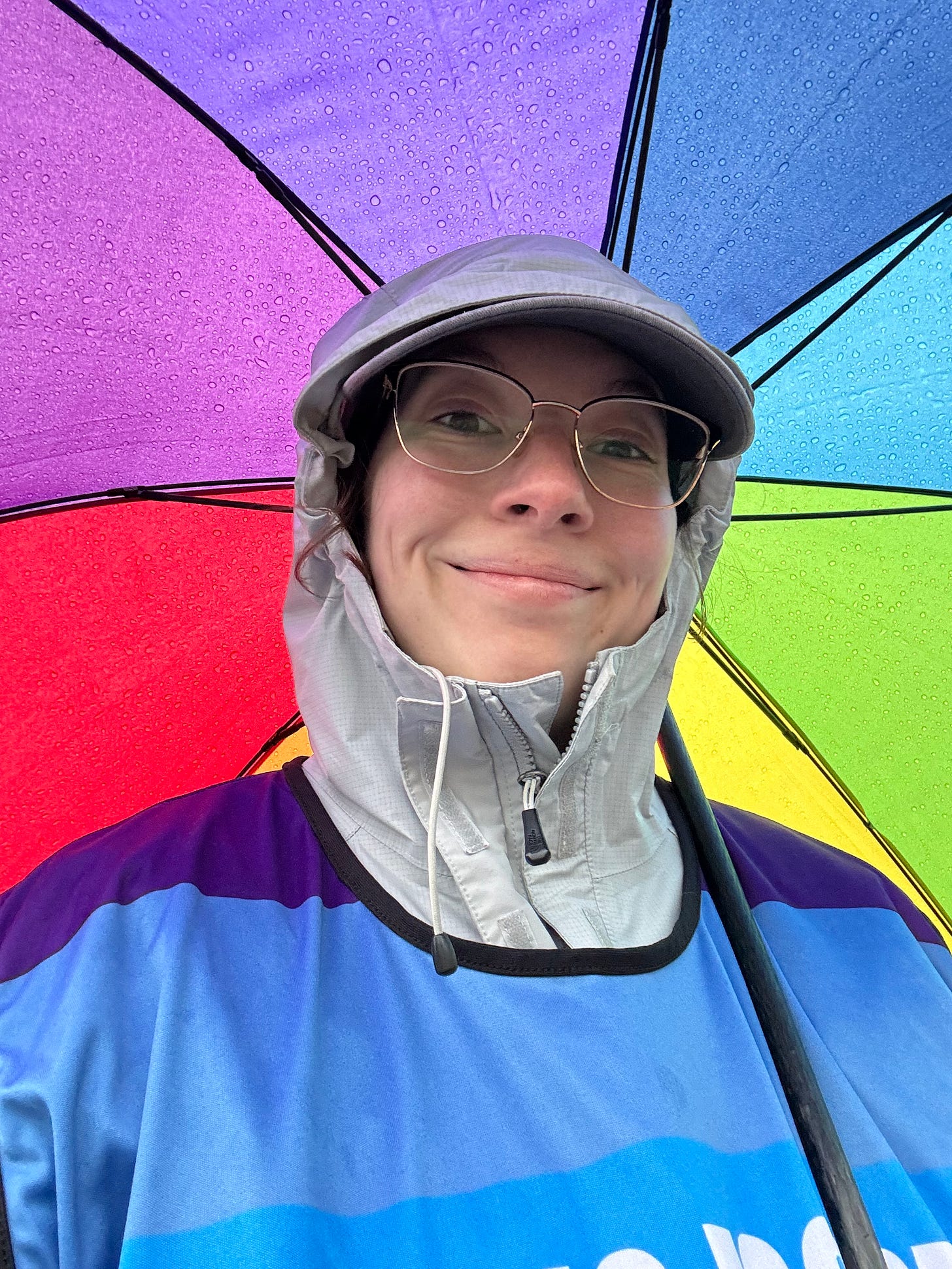Hello beloved community,
We’ve got a lot to cover today, so let’s get stuck into it.
Why are we talking about abortion? Because I am a body, and you are a body. And bodies have abortions.

Last week, I talked about being an abortion doula. A doula, in general, has historically been defined as a non-medical companion who provides physical, emotional, and practical support to birthing people (per The Doula Network). Most doulas work with people having babies! I am working on a certification program for full-spectrum doulas, defined below, which includes abortion care.
A note about gendered language. Many abortion-related resources and conversations will refer to the people receiving abortions as women. We know that women get abortions, and we also know that people of varying gender identities get abortions, too. Trans and nonbinary individuals continue to be systemically discriminated against in healthcare (and other!) settings.
To move the conversation toward a more inclusive place and avoid reproducing harm to trans/nonbinary people, I will follow the lead of queer, nonbinary, and trans reproductive health activists and refer to “pregnant people,” “patients,” “people seeking/receiving abortions,” etc. rather than “women” or “mothers.”
Some of the resources provided here may not use gender-expansive language—if I linked them, I think they’re useful and you should check them out! But I’d encourage you to join the broader birth community in shifting our collective language. (Moss Froom is a trans birth worker I really appreciate, if you’re looking for more info and delightful merch.)
Full Spectrum Doula: I’ll use Birthing Advocacy Doula Trainings (BADT)’s longer definition of a full-spectrum doula:
A full-spectrum doula is a care worker who witnesses and supports clients and community members through life and reproductive transitions. They may offer physical, emotional, informational, and/or advocacy support. A doula-client relationship tends to be relationally-focused, with both parties working towards trust, rapport, and open communication. A doula-client relationship may last a handful of days or a handful of months or even years.
While doulas often serve in or alongside the medical environment and hold a great deal of knowledge around medical and physiological processes, they are not medical professionals and do not perform any medical assessments, treatment, or advice.
At BADT, we also believe that doulas are an essential part of the Reproductive Justice movement. While doulas may work primarily 1:1 with clients, they are upholding and contributing to the values of bodily autonomy and choice.
Yeehaw! So let’s go ahead and jump into Reproductive Justice.
Reproductive justice (RJ): A framework conceptualized by people of color to address the intersecting oppressions around reproductive care and experiences. I’ll use the further definitions from SisterSong, which is “the largest national multi-ethnic Reproductive Justice collective.”
SisterSong defines Reproductive Justice as the human right to maintain personal bodily autonomy, have children, not have children, and parent the children we have in safe and sustainable communities.
To achieve Reproductive Justice, we must…
Analyze power systems. Reproductive politics in the US is based on gendered, sexualized, and racialized acts of dominance that occur on a daily basis. RJ works to understand and eradicate these nuanced dynamics.
Address intersecting oppressions. Audre Lorde said, “There is no such thing as a single-issue struggle because we do not live single-issue lives.” Marginalized women face multiple oppressions and we can only win freedom by addressing how they impact one another.
Center the most marginalized. Our society will not be free until the most vulnerable people are able to access the resources and full human rights to live self-determined lives without fear, discrimination, or retaliation.
Join together across issues and identities. All oppressions impact our reproductive lives; RJ is simply human rights seen through the lens of the nuanced ways oppression impacts self-determined family creation. The intersectionality of RJ is both an opportunity and a call to come together as one movement with the power to win freedom for all oppressed people.
Alright, we’ve been talking about abortion (as has the US Supreme Court) so let’s make sure we know what we’re talking about.
Abortion means ending a pregnancy. There are two main types of abortions, which, since Roe vs. Wade was overturned in the Supreme Court in 2022, are only available to the degree that state governments have dictated at any given moment.
A medication abortion involves the use of one or two medications to end a pregnancy. This is typically available earlier in pregnancy than a procedural abortion, and is most often completed partially in-clinic and partially at home. (There are options for self-managed abortion for folks with state restrictions—check out Plan C and SASS below for more information.)
A procedural abortion is also called an in-clinic abortion. Some people call it a surgical abortion—but it is not a surgery! In a procedural abortion, a patient’s cervix is dilated and numbed, and the contents of the uterus are removed. It usually takes only a few minutes, and can be performed in a variety of medical settings.
In an ideal world, patients could decide 1) whether or not to be pregnant, and 2) what kind of abortion to obtain, should they choose to. Our bodies do not live in an ideal world. In each state, there are differences in the availability of abortions and the experiences that patients must go through to obtain abortions (including waiting periods, mandatory counseling, etc). Often people have to travel to different areas to obtain abortion services, which of course creates vast challenges for people whose employment, childcare, or financial status does not have room for multi-day travel.
Abortions are sometimes covered by insurance, but many people struggle to pay if they have to receive services out of pocket. Abortion funds offer funding to patients who need it. Local abortion funds often also run networks of practical support, including housing, transportation, and childcare for abortion patients. That’s how I got to drive folks to their appointments back in Virginia!
Now, I’m a clinic escort. That means I help direct folks who have appointments (for all kinds of reproductive care!) to the clinic, show them where to park, and walk them in and out of the building, in—what’s the postal service slogan? Rain, sleet, heat, snow?

Why do we need clinic escorts? Well, lemme tell ya about a little horrible thing called Crisis Pregnancy Centers (CPCs). I’ll use the American College of Obstetricians and Gynecologists (ACOG)’s definition:
CPC is a term used to refer to certain facilities that represent themselves as legitimate reproductive health care clinics providing care for pregnant people but actually aim to dissuade people from accessing certain types of reproductive health care, including abortion care and even contraceptive options. Staff members at these unregulated and often nonmedical facilities have no legal obligation to provide pregnant people with accurate information and are not subject to HIPAA or required by law to maintain client confidentiality. Many CPCs are affiliated with national organizations that provide funding, support, and training to advance a broad scale antiabortion agenda.
At the clinic where I volunteer, clinic escorts are typically outnumbered 4:1 by paid CPC employees (and other anti-abortion protestors), who use the following tactics to prevent patients from obtaining abortion care:
Wearing vests and populating streets around the clinic neighborhood in order to appear to be clinic employees and to misdirect, waylay, and harass patients
Distributing anti-abortion propaganda (as well as snacks, tiny plastic babies, and more), often through car windows after stopping folks in the roads outside the clinic
Blocking traffic and giving incorrect directions in an attempt to have patients miss their appointments
Parking an RV a few feet from the clinic property line that advertises “free pregnancy services” while not providing licensed, HIPAA-compliant, or even formal medical care
Advertise heavily online using SEO and other tools to redirect people seeking abortion care to their websites/“clinics”/anti-abortion hotlines
Shouting incorrect, offensive, and coercive things at patients and companions walking in and out of the clinic (and clinic escorts, lol)
So that’s cute, that’s fun!
(Don’t worry, I have more to say about all that in the coming weeks, and maybe forever.)
Phew! That was a mouthful. What questions do you have? How does your body feel? Let me know! And remember, we are not debating human dignity in our lil comments section.
Some orgs I recommend checking out if you’re interested in learning more:
Aya Contigo (Español y Ingles) - informational accompaniment before, during, after abortions
All Options Talkline - unbiased support and training re: reproductive health decisions
Birthing Advocacy Doula Trainings
Clinic locator tool (Planned Parenthood)
Exhale Pro-Voice - non-judgemental after-abortion support
National Network of Abortion Funds
Plan C Pills - resources for obtaining medication abortion in every US state
Repro Legal Helpline - legal resources and counseling for reproductive health decisions
SASS (Self-Managed Abortion, Safe and Supported)
Shout your abortion - storytelling and advocacy, normalizing abortion experiences
See you next week.
With love,
Liddy





These have been so helpful in understand the specifics and intricacies of these topics. Thank you for taking the time to educate 💜